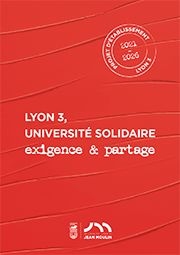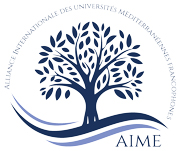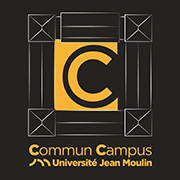AccueilRechercheProgrammes et productions scientifiquesThèsesThèses soutenuesThèses soutenues - 2006-2021Thèses soutenues - 2012
-
Partager cette page
- Recherche,
REBEILLE-BORGELLA Marie
Vocare et uocatio, leurs préverbés et préfixés : étude sémantique
Publié le 4 janvier 2013 – Mis à jour le 15 février 2013
Thèse en Lettres et civilisations antiques soutenue le 12 décembre 2012
La présente thèse s’intéresse à uocare, uocatio, les préverbés de uocare et les dérivés nominaux des préverbés de uocare, et plus particulièrement à leurs signifiés et la manière dont ceux-ci sont reliés entre eux, chez les auteurs chrétiens de langue latine à l’époque patristique et dans la Vulgate. Le but de ce travail est double : il porte d’une part sur l’étude des réseaux de signifiés propres à chaque lexème dans la langue des auteurs chrétiens et des interactions sémantiques qui existent entre les verbes étudiés et leurs dérivés nominaux, ainsi qu’entre uocare et ses préverbés et uocatio et les dérivés nominaux des préverbés de uocare, et d’autre part sur l’influence des traductions latines de la Bible sur la constitution des réseaux de signifiés des termes étudiés. Cette recherche s’appuie sur la méthode dite d’analyse componentielle consistant à découper les signifiés en traits sémantiques minimaux pertinents, afin de procéder à des regroupements et de dégager une hiérarchie entre les signifiés.
This PhD thesis deals with uocare, uocatio, prefixed verbs on uocare and nouns derived from prefixed verbs on uocare, and specially with their meanings and the way they are connected one to each other, in the works of Latin-speaking christian writers at patristic era and in the Vulgate. This work has two aims : it turns on the one hand on the study of the network of meanings specific to each lexem in christian writers’ language and of the semantic interactions existing between verbs our research focuses on and the nouns derived from them, and also between uocare and prefixed verbs and uocatio and nouns deriving from prefixed verbs on uocare, and on the other hand on the influence of the Bible’s latin translation on the formation of the networks of meanings of the studied terms. This research is based on the method called componential analysis, which consists in dividing the meaning in pertinent minimal semantic features, in order to initiate groups of meanings and to have the hierarchy of meanings become evident.
Mots-clés : sémantique latine ; latin des auteurs chrétiens ; latin des traductions latines de la Bible ; analyse componentielle.
Key words : Keywords : latin semantics ; latin christian writers’ language ; biblical latin translations’ language ; componential analysis.
Directeur de thèse : Christian NICOLAS
Membres du jury :
Michèle FRUYT, Professeur, Université Paris 4 - Sorbonne
Jean-Fran?ois THOMAS, Professeur, Université Paul Valéry, Montpellier
Bruno BUREAU, Professeur, Université Jean Moulin Lyon 3
Dominique GONNET,, Ingénieur de recherche, Sources Chrétiennes, Lyon
Christian NICOLAS, Professeur, Université Jean Moulin Lyon 3.
Président du jury : Michèle FRUYT
Mention : Très honorable avec les félicitations du jury
Equipe d'accueil : HISOMA
This PhD thesis deals with uocare, uocatio, prefixed verbs on uocare and nouns derived from prefixed verbs on uocare, and specially with their meanings and the way they are connected one to each other, in the works of Latin-speaking christian writers at patristic era and in the Vulgate. This work has two aims : it turns on the one hand on the study of the network of meanings specific to each lexem in christian writers’ language and of the semantic interactions existing between verbs our research focuses on and the nouns derived from them, and also between uocare and prefixed verbs and uocatio and nouns deriving from prefixed verbs on uocare, and on the other hand on the influence of the Bible’s latin translation on the formation of the networks of meanings of the studied terms. This research is based on the method called componential analysis, which consists in dividing the meaning in pertinent minimal semantic features, in order to initiate groups of meanings and to have the hierarchy of meanings become evident.
Mots-clés : sémantique latine ; latin des auteurs chrétiens ; latin des traductions latines de la Bible ; analyse componentielle.
Key words : Keywords : latin semantics ; latin christian writers’ language ; biblical latin translations’ language ; componential analysis.
Directeur de thèse : Christian NICOLAS
Membres du jury :
Michèle FRUYT, Professeur, Université Paris 4 - Sorbonne
Jean-Fran?ois THOMAS, Professeur, Université Paul Valéry, Montpellier
Bruno BUREAU, Professeur, Université Jean Moulin Lyon 3
Dominique GONNET,, Ingénieur de recherche, Sources Chrétiennes, Lyon
Christian NICOLAS, Professeur, Université Jean Moulin Lyon 3.
Président du jury : Michèle FRUYT
Mention : Très honorable avec les félicitations du jury
Equipe d'accueil : HISOMA
Documentation
Mise à jour : 15 février 2013







